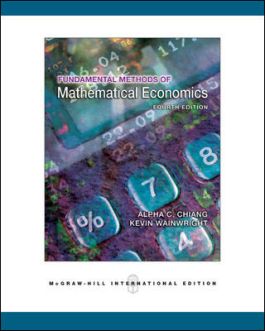PART 1 Introduction
Chapter 1: The Nature of Mathematical Economics
Chapter 2: Economic Models
PART 2 Static (or Equilibrium) Analysis
Chapter 3: Equilibrium Analysis in Economics
Chapter 4: Linear Models and Matrix Algebra
Chapter 5: Linear Models and Matrix Algebra (continued)
PART 3 Comparative-Static Analysis
Chapter 6: Comparative Statics and the Concept of the Derivative
Chapter 7: Rules of Differentiation and their use in Comparative Statics
Chapter 8: Comparative-Static Analysis of General-Function Models
PART 4 Optimization Problems
Chapter 9: Optimization: A Special Variety of Equilibrium Analysis
Chapter 10: Exponential and Logarithmic Functions
Chapter 11: The Case of More Than One Choice Variable
Chapter 12: Optimization with Equality Constraints
NEW Chapter 13: Further Topics in Optimization (includes Envelope Theorem and Duality
PART 5 Dynamic Analysis
Chapter 14 Economic Analysis and Integral Calculus
Chapter 15 Continuous Time: First Order Differential Equations
Chapter 16 Higher-Order Differential Equations
Chapter 17 DiscreteTime: First Order Difference Equations
Chapter 18 Higher Order Difference Equations
Chapter 19 Simultaneous Differential Equations and Difference Equations
NEW Chapter 20: Introduction to Optimal Control Theory
It has been twenty years since the last edition of this classic book. Kevin Wainwright (British Columbia University and Simon Fraser University), a long time user of the text, has executed the perfect revision: he has updated examples, applications and theory without changing the elegant, precise presentation style of Alpha Chiang. Readers will find the wait was worthwhile.
Many new, innovative examples based on current economics.
Expanded applications, especially in chapters 8,11, and 12.New chapter covering envelope theorem, maximum value function, and duality.In part five add a new chapter on optimal control theory and modernize the models.Delete part 6 (Mathematical Programming) and move nonlinear programming (21) to follow Optimization with equality constraints (12).
Elegant Yet Lucid Writing Style: Chiang�s strength is the eloquence of the writing and the manner in which it is developed. While the content of the text can be difficult, it is understandable.
Meshes Sophisticated with the Accessible: Sophisticated material is presented in the text, but not a lot of prior knowledge is assumed. The background needed for the course is there. The combination of depth of material and ease of exposition is the reason that graduate students and faculty alike have kept their copies of Chiang from their undergraduate days.
A Classic Text: Chiang literally wrote the book on the subject matter and is one of the most widely-respected Economics texts in the world.

